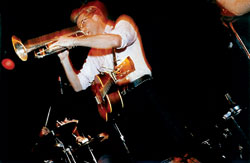Playing a flaming trumpet is one of those ridiculously theatrical flourishes that makes rockabilly so much fun. Like goths, rockabilly kids are a subculture with their own icons: devils, dice, and hot rods; Betty Page cuts on the girls and Elvis sideburns on the guys. Drinking (lots of it), packs of cigarettes rolled up into T-shirts. It’s white trash raised to performance art, and the music is great to party to.
But it’s not necessarily what you’d expect on the stage of the 5th Avenue. There the shows tend to be anodyne and family-friendly, carrying a faint whiff of Pine-Sol. So what were they thinking when they decided to cast Billy Joe Huels of the Dusty 45s—whose signature stunt is lighting his trumpet on fire—in the lead of the musical Buddy: The Buddy Holly Story?
“Traditional musical theater performers have a very specialized set of skills, like synchronized dancing and a particular sort of singing style,” says Buddy director David Bennet. “But I really wanted something different for this show. And Billy’s got it.”
Bennett, who grew up near Holly’s hometown of Lubbock, Texas, says he was also impressed with the rapport Huels’ band has with its audience. “When I first saw them down at the Owl ‘n Thistle, it just blew me away how much this crowd loved them, and how good they were at giving them a good time,” Bennett says. “It’s a crazy scene, but I imagine that there are similarities to what some of Buddy’s early concerts must have been like.”
In the rockabilly pantheon, Buddy Holly’s the slightly nerdy brain of the outfit, an innovative prodigy who traded in sex appeal for boyish enthusiasm. (His cheerful, happy sound mimics a 15-year-old who’s just figured out his first bra strap—”Oh boy!”) His innovations included writing and producing his own songs, making famous the Fender Stratocaster guitar, and little vocal tricks like the extra hiccupy “uh” added for emphasis on songs like “That’ll Be the Day.” He wrote and recorded more than 30 classics, including “Oh Boy,” “Everyday,” “Maybe Baby,” and “Peggy Sue,” and his fans included Elvis, the Stones, and McCartney and Lennon, who named the Beatles as a tribute to Holly’s band the Crickets. He famously died in the 1959 plane crash that also killed Ritchie Valens and the Big Bopper and that inspired Don McLean’s signature song.
Huels admits he feels more comfortable doing the concert sequences in the show than the acting, though he’s working with a coach. Still, the music has its challenges, too. “I’m trying to adapt my own style of guitar to this twentysomething from Lubbock,” Huels says. “He was pretty much self-taught, and learning to play like he did is a challenge. He just bangs his guitar, man. But it’s all part of trying to channel Buddy.”
Along with Huels, the production features a slew of local musicians, including Matt Weiner and Mike Daughtery from Casey McGill’s Blue 4 Trio, John Ackermann of Awesome, and Huels’ sometime bandmate Kelly Van Camp as the Big Bopper. The list reads like a who’s who of Seattle’s bar rock scene, and it’ll be interesting to see what occurs on opening night as the Eastside regulars of the 5th, in furs and sparkly dresses, meet the duded-up regalia of the local rockers.
Surprisingly, Huels admits that he has an affection for a whole host of musicals. “I wouldn’t say I’m a fan of Cats, but I love Rodgers and Hart, Hammerstein, Cole Porter, Irving Berlin—I thought the 5th’s production of White Christmas was great. I mean, I like jazz, rock, honky-tonk—good music’s good music.”
Does he worry that some of his hard-drinking rockabilly fans might think his love of musicals is, er . . . “Not cool?” he answers, then gives a big laugh. “I could care less. That’s my attitude. I like what I like. Hey, it wouldn’t be rock and roll to care, right?”








